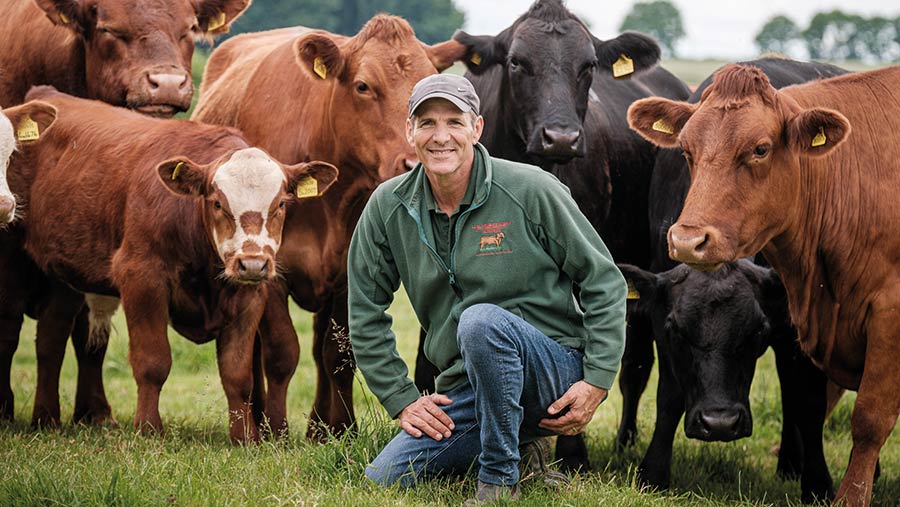Farmers Weekly Awards 2021: Mixed Farmer of the Year
 © Jim Varney
© Jim Varney Paul Temple, Wold Farm, East Yorkshire
Yorkshire farmer Paul Temple describes himself as not only a mixed beef and arable farmer but also a soil scientist in the making.
His impressive drive to improve soil biology across his medium clay loam land, while cutting back on inputs and notable business management has earned him the title of this year’s Farmers Weekly Mixed Farmer of the Year.
With a six-year rotation in place at the tenanted farm, crops benefit from organic manure applications from the 550-head beef herd, requiring no bought-in P and K fertiliser.
With subsides shrinking, Mr Temple decided that his farming ways had to change, prompting him to double cattle numbers and begin the quest of conservation agriculture to get his soils working for him.
He decided to go down the no-till establishment route, which has had many positive impacts, with both machinery and labour costs cut by one-third and overall N applications on track to be reduced by 25%.
In fact, winter wheat crops receive just 160kg N/ha and still yield an impressive 10t/ha.
Farm facts
- 360ha beef and arable farm plus 80ha seasonal grass with 550-head of beef, including 240 suckler cows
- Cropping includes winter wheat grown for seed on contract, winter barley for home consumption and vining peas
- Strong focus on soil biology, cutting back on insecticide and fungicide sprays
- Arable enterprise benefits from manure applications with no bagged P and K
- All crops are established with a Weaving direct-drill
Reduced inputs
Insecticides are being phased out and fungicides are used sparingly as Mr Temple looks to make the most out of soil biology, where organic matters have risen to 7-8%.
“We have not used a T0 spray for four years and just apply two main fungicides at late T1 and T2.5,” he says.
Always producing to a marketing plan, crops are never established purely on speculation. Wheat is grown for seed on contract, barley for home consumption and vining peas are grown for Swaythorpe Peas.
All crops are established with a Weaving direct-drill, which replaced the plough, power harrow and Vaderstad drill five years ago.
“One challenge we face is making vining peas work consistently under no-till establishment,” he says.
Beef herd
Much like the arable enterprise, beef cattle are produced to a specific store market.
“For our livestock marketing, we have used a variety of direct marketing platforms, with repeat buyers for our store stock.”
Stabilisers have been the breed of choice at Wold Farm for many years due to their low cost, good fertility and maternal traits.
Improving cattle infrastructure to optimise efficiency, safety and animal health was a priority when the suckler herd was doubled to 240.
The farm now sets its sights on 300 sucklers managed with the same level of labour, with the ultimate aim of fattening on-farm and working with the local abattoir.
Cows calve from February to mid-April, when the arable enterprise is quieter. Cows with calves at foot then graze rented permanent pasture grassland a maximum of 10 miles from home, where Mr Temple has designed easy-to-use handling facilities on off-ground.
Calves are weaned at 300-340kg and fed a total mixed ration, with daily liveweight gains of 800g.
The 40 best-performing heifers are kept as replacements to ensure good herd performance, accounting for growth rate, dam performance and temperament.
Community
Mr Temple has an impressive awareness of costs and believes the mixed-farm approach offers a great working experience.
The farm is currently in Higher Level Stewardship with educational access for schools and colleges, where he takes pride in offering young people their first opportunity of work and responsibility.
He has also been actively involved with the NFU, AHDB, EU Cereals, Oilseeds & Proteins Group and Global Farmer Network.
Winning ways
- Exceptional beef and arable market understanding on both a national and international level
- Impressive wheat yields with reduced nitrogen applications
- Strong focus on business management and cutting production costs
- Excellent drive towards conservation agriculture and promoting soil health
- Great involvement within the agricultural industry, with a variety of positions held
A word from our independent judge
“Paul is an ambassador for the industry. His focus on business management, soil health and market understanding is exceptional. His wheat yields are quite incredible considering the level of N he is applying.”
Matthew Curry, managing director, North East Grains
Our other finalists were:
- The Carlisle family, Rowles Farm, West Berkshire
- Huw and Meinir Jones, Bryn Farm, Ceredigion
Read about the other finalists
The Farmers Weekly 2021 Mixed Farmer of the Year Award is sponsored by Cawood Scientific

Farmers Weekly’s farming awards celebrates the very best of British agriculture by recognising hard-working and innovative farmers across the UK.
Find out more about the Awards, the categories and sponsorship opportunities on our Awards website.

